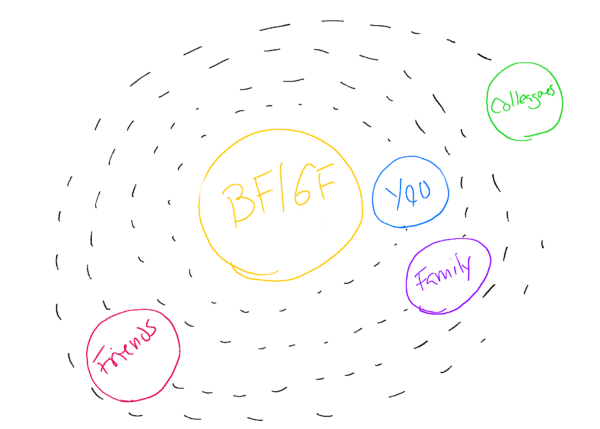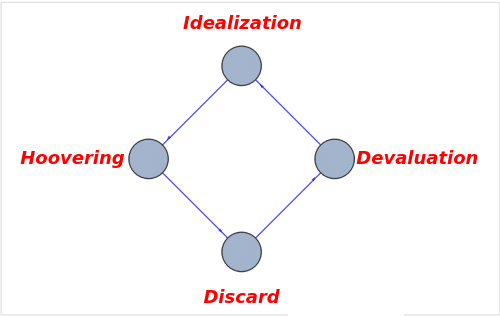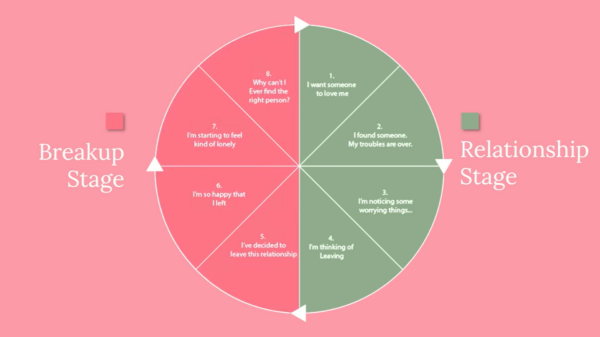Today I’m going to answer if your narcissistic ex is capable of thinking about (or missing you) after a breakup.
And the truth is that,
Yes, they are capable of thinking about you or missing you after a breakup. However, it’s important to remember that everything with narcissists is related to the self. It’s likely that your narcissistic ex will only be thinking about you if it affects them in some negative way
I highly recommend you read my article on how to determine if your ex is a narcissist before continuing this article (so it makes more sense.)
Ultimately your narcissistic ex must have one of the following five factors if they are going to be a in a situation where they cant’ stop thinking about you.
- A Refusal For Empathy
- Missing The Supply Of Admiration
- A Missing Of The Control Or Power
- Idealization And Devaluation
- Narcissistic Injury
There’s a lot to talk about so let’s dive in to it.

What Are Your Chances of Getting Your Ex Boyfriend Back?
Take the quizFactor #1: A Refusal For Empathy
It goes without saying that narcissists often struggle with empathy, so they might not miss their partner in the way that someone with a high degree of empathy might.
They might miss the benefits they receive from the relationship more than the person themselves.
And in the past, I’ve talked about this philosophical battle between these two states of altruism versus egoism.
Let’s put on our philosophical caps here today and talk about philosophy.
- One school of thought asserts that humans can be altruistic or selfless.
- Another school posits that people can only perform egoistic, self-interested acts.
Narcissists can be viewed as fervent egoists, unable to empathize with your situation.
However, it’s not that they are entirely devoid of empathy.
I found this great article written by Macy C. Lamia, a Ph.D., arguing that narcissists don’t actually lack empathy they’re just unwilling to empathize.
Why?
Well, it’s because they prioritize themselves over all things. But the natural assumption you see thrown out there flagrantly is that narcissists are incapable of empathy.
But that’s actually not true, at least according to Macy here.
They have the capacity for empathy; they’re just unwilling to empathize with others because they care about themselves.
And what you’re going to find as we get through the rest of these five factors is that’s going to be a common theme.
Yes, they can miss you or think about you, but only if it affects them in some way.
Factor #2: Missing The Supply Of Admiration
Narcissists often seek relationships where they receive a constant supply of admiration and attention.
If a past partner provided this, they might miss that relationship aspect.
When researching this topic, what stood out to me was the cycle of avoidance and anxiety.

What Are Your Chances of Getting Your Ex Boyfriend Back?
Take the quizAs I have stated, (LITERALLY HUNDREDS OF TIMES), Many of our clients have anxious attachment styles,

While their ex-partners often display avoidant attachment styles.

This observation led me back to my research on codependency.
In fact, this article shows an attraction between narcissists and codependent individuals, making the relationship, especially for the codependent, extremely hazardous.
At first glance, there seem to be numerous similarities between the disorders of codependency and narcissism.
- Both codependent and narcissistic individuals need to feel needed
- Are very sensitive to criticism
- Are insecure
- Harbor deep fears of abandonment
- And rely heavily on others.
However, codependents suffer more due to their:
- Heightened sensitivity
- People-pleasing tendencies
- Self-care deferment
- Low self-esteem.
Narcissists take until there’s virtually nothing left, then spit the codependent out.
The reason I bring this up is that narcissists crave admiration.
After a breakup, during their discarding phase, what they might miss about you aren’t the shared moments per se but the moments of admiration you provided.
If you have an anxious attachment style or codependent tendencies, you probably showered them with admiration throughout the relationship.
That’s what they miss.
And this leads us seamlessly to the next order of business.
Factor #3: Control And Power
The truth is that I view these two factors:
- Admiration
- Control and power
As two sides of the same coin.
If the relationship afforded the narcissist a sense of control or power, they might miss that.
As I’ve discussed, individuals with codependency often elevate their ex-partners onto what I call a pedestal.
The exciting aspect of the pedestal effect is that it’s not usually there from the start.
We all have an internal pedestal, always seeking someone we perceive as our equal or superior.

What Are Your Chances of Getting Your Ex Boyfriend Back?
Take the quizTypically, my clients start by placing someone they view as an equal on the pedestal; let’s say this is your narcissistic ex.
At the start of the relationship, you draw your narcissistic ex in and perceive them as your equal or even below you.
However, throughout the relationship, especially if you have codependent tendencies, your life starts to revolve around this individual.

Something that we caution against because this action elevates them above you on the pedestal in their mind.
Consequently, they may believe they’re superior and can get you back anytime.
This mindset makes it easier for them to discard you, as they feel control and power over you.
They relish seeing you under their influence, making your entire life revolve around them.
After the relationship ends, after they’ve discarded you, they might reminisce about the control and power they once wielded over you.
Factor #4: Idealization And Devaluation
The narcissistic abuse cycle is a framework we need to talk about in order to understand this factor.
I’ll display a graphic I’ve prepared to guide us through the stages.

- Idealization
- Devluation
- Discard
- Hoover
Essentially, I’m trying to make the argument that narcissists cycle through periods of idealizing and devaluing their partners.
They might miss or dwell on them considerably if they’re in the idealization phase regarding a past partner.
However, you must comprehend the workings of each of these four phases.
The Idealization Phase
Let’s start with the idealization phase, where the narcissist elevates their partner, showering them with praise and attention. This stage can make the partner feel exceptional and deeply cherished.
We see the pedestal effect at play here.
As previously mentioned, at the start of the relationship, you likely occupy a position equal to or higher than the narcissist on the pedestal.
However, this equilibrium eventually gives way to the devaluation phase.
The Devaluation Phase

What Are Your Chances of Getting Your Ex Boyfriend Back?
Take the quizThe narcissist begins to belittle their partner, criticizing them or making them feel worthless.
This stage can be bewildering and painful for the partner because it often appears unprovoked.
Yet, it invariably happens, leading us to the discard stage.
The Discard Stage
In the discard stage, the narcissist abruptly and sometimes cruelly ends the relationship.
This stage can leave you devastated and perplexed, perhaps even wanting to reunite due to your codependent tendencies – your life most likely having revolved around them.
I’m not implying that you’re codependent, but this article, suggests a correlation between codependent and narcissistic attractions.
The codependent wants to give, the narcissist wants to take, and their union creates a discordant dynamic.
Following the discard stage, you feel ravaged and disoriented. This leads us to the hoovering stage, named after the vacuum cleaner.
The Hoover Stage
The narcissist attempts to draw their partner back into the relationship, often feigning transformation or playing on the partner’s sympathies.
This stage can be highly manipulative and confusing.
After hoovering, they revert to idealizing, creating an oddly symbiotic relationship between these four key stages of the narcissistic abuse cycle.
Yet, the more I thought about how this all works the more I realized that that I think everyone has it wrong.
How I Think The Narcissistic Abuse Cycle Should Really Work
In a peculiar sense, the hoovering stage can only ensue once the idealization phase reoccurs.
Typically, the cycle is illustrated with idealization at the top, followed by devaluation, discard, and hoovering, before idealization sets in again.

However, this conventional graphic is flawed.
It should progress from:
Idealization to devaluation, discard, a return to idealization, then hoovering, before the cycle recommences again from the start.
So, if your narcissistic ex appears to miss you or is idealizing you, they might simply be trapped in the idealization phase once more.
We’ve observed this frequently.
We’ve also identified a slight correlation between individuals with Narcissistic Personality Disorder and those with avoidant attachment styles.
This resembles my relationship death wheel,

Where I discuss how an avoidant perceives a relationship and how the cycle operates.
Factor #5: Narcissistic Injury
If the breakup inflicted a narcissistic injury – a blow to an exes’ self-esteem or self-worth – they might be more fixated on healing that injury than missing their former partner.
Their renewed interest or nostalgia for you may be less about you as an individual and more about restoring their bruised self-esteem.
A profound lecture by Dr. Alfred Langel, spanning over two hours, elucidates this concept in depth,
His compelling, albeit alarming, argument introduced me to the idea of narcissistic injury.
According to Dr. Langel, if you wish for a narcissist to return, the most effective strategy is to harm their self-esteem, which may have the impact of attracting them back BUT only so they can repair their bruised ego.
Thus, as strange as it may sound if the breakup damaged their self-esteem or self-worth in any way, their return is more likely to focus on mending that injury rather than on any sentiment for their former partner.
They may return primarily seeking vindication for the harm inflicted upon them.
This egoistic, retaliatory tendency makes Narcissistic Personality Disorder particularly perilous.
The crux here is not that they are incapable of empathy but rather that their empathy is primarily, if not exclusively, directed toward themselves.
This is the key takeaway when considering whether your narcissistic ex misses you. They may think about you, but it’s invariably entwined with a focus on self.
Observe how each of the five factors I’ve discussed revolves around them.
- The lack of empathy is about their inability to empathize with others.
- The quest for admiration is about their need for adulation.
- The loss of control and power is about their dominance being challenged. Their movement through the cycle of idealization and devaluation is entirely about their perception.
- And finally, the narcissistic injury stage is triggered by a perceived blow to their self-esteem – again, all about them.
So if you’re ever questioning whether your narcissistic ex thinks about you, the answer is ‘yes,’ but typically only if these five factors are in play.
Gugu
June 26, 2024 at 7:39 am
I enjoyed the article ♥️